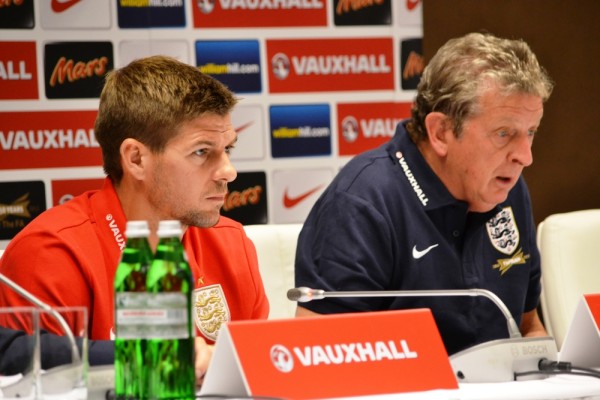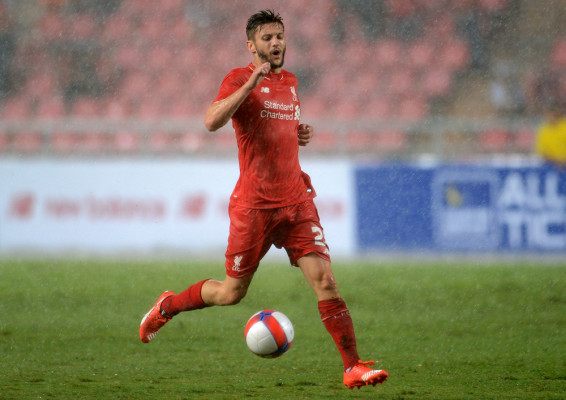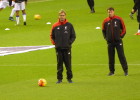Some people genuinely love international football. I honestly can’t get my head around why, but I respect their conviction. Plenty of others don’t like it at all and, as you may well have already guessed, I’m with them. Don’t get me wrong, I enjoy it when the summer comes around every two years and the void left by the absence of Premier League football is filled with the European Championship or the World Cup. Yet when I find out that the regular season is taking a break because of some pointless friendlies or qualifiers it makes me want to tear my hair out.

The weird thing is that I used to love it. When England was the host nation of Euro ’96 I couldn’t have been more excited, doing a sticker book and a wall chart and watching as many games as I possibly could. Maybe it was because games were hosted at Anfield, or because Terry Venables seemed like a bit of a laugh to younger me, I don’t know. I vaguely remember enjoying the World Cup in ’98 2002 and the Euros in 2000, but by 2004 I was starting to realise that Liverpool Football Club was the only thing I truly cared about when it came to sport. Here’s a look at why it’s all a load of old tosh.
The Hypocrisy
There are many things in football that have a healthy dose of hypocrisy to them. You only need to look back to how virtually every single set of supporters treated Luis Suarez when he played for us then compare that to how they treated their own bad boys (to say nothing of how desperate they were for him to play for their team) to see hypocrisy in action. Evertonian’s used to call him a ‘disgrace’ whilst also hero-worshipping Duncan Ferguson; a player who had been sent to prison for an assault he committed on the football pitch.
Top legend #duncanferguson #EvertonFC pic.twitter.com/e8sBOKFxBZ
— Jamilah Macca (@JamilahMacca) March 25, 2017
Yet it is the hypocrisy of international football that finally turned me off it. I remember the moment the penny dropped for me really distinctively. I went to drama school in Birmingham to train as an actor. I used to go to the same pub every week to watch Liverpool’s matches and there was also the same stuff; ‘Jokes’ based on Scouse stereotypes, cheering for the opposition and relentless slagging off of Steven Gerrard. It tended to be the same old people doing it, normally Aston Villa fans who thought he was ‘over-rated’ and ‘no Gareth Barry’. I didn’t watch all of the England matches there, but I did head to that same pub for England’s game against Portugal in the quarter-finals of the 2006 World Cup.

You’ll probably remember that the game in Gelsenkirchen was a tense one. Neither side could find a breakthrough in normal time, despite David Beckham heading off injured just after the half-time break and then Wayne Rooney getting sent off on the hour mark. During the match those same people who had called Steven Gerrard every name under the sun during the Premier League season were shouting his name, singing the ‘Stevie G’ song and generally getting right behind him. As if that wasn’t galling enough, the abuse hurled at him when he missed his penalty was vitriolic in its nature. I couldn’t believe the hypocrisy of it all and left the pub shaking my head.
Aston Villa are relegated a year after fans ‘celebrated’ Steven Gerrard’s birthday
Karma = job done pic.twitter.com/QD8Ac2AYFa— Lemuel (@Lil_Magician10) April 16, 2016
The contrast between how they were acting towards Gerrard and how I felt about Rooney was stark. I couldn’t join in the chanting of his name, having spent the entire season despising him and slagging him off every chance I had. He was a United player and I therefore hated him. Was I really supposed to put all of that to one side just because he’d pulled on an England top? I simply couldn’t do it. When I left the pub and got the bus home I was despondent when I looked out of the window and saw people in England kits destroying public property, using the loss as an excuse to imitate the hooliganism they’d seen on the TV.
When England lost 4-1 to Germany in 2010 I was in London and emerged from the pub to see crowds of people smashing in the windows of a Häagen-Dazs shop and setting fire to its flag, seemingly unaware that it was founded in Brooklyn and not Germany. I realised that so many of the people that came out to watch England games weren’t football fans at all, they just liked to use it as a reason to behave like morons. Any time I see stories on the news about England fans acting like hooligans I remember that day. These aren’t the sort of people I think of as football supporters and from the day onwards I simply stopped caring about my national side.
How The Press Treats Managers
Another reason I struggle to get behind the national team is the way that the English press treats the national side’s manager. By the time that Fabio Capello took over as England manager in 2008 he had already won seven serie A titles (though two were later revoked), two La Ligas the Champions League and a European Super Cup. Yet the press wrote stories about him as if he was a two-bit hack who had no idea how to manage. His ‘strict’ nature was mocked and his football was referred to as dour and boring. Precisely zero respect was shown to his previous achievements.
Fabio Capello didn’t he run England once?
Bloody auto correct
I mean ruin.
— Bowden_Saint (@bowden_saint) March 13, 2017
When it came to Roy Hodgson, on the other hand, his mates on Fleet Street bent over backwards to excuse his genuinely terrible time in charge of England. It was never Hodgson’s fault, he was always let down by the players who didn’t work hard enough, didn’t play well enough or couldn’t understand Hodgson’s instructions. Even when The Hodge’s charges got humiliated by Iceland last year there were plenty of newspapers who refused to turn on him. The coverage of managers such as Capello and Sven Goran Eriksson was xenophobic in comparison to how Hodgson and inexperienced people like Gareth Southgate have been treated. It leaves a bad taste in the mouth.
It Breaks Up The Season
Jürgen Klopp has always been keen to point out that he totally accepts why there is no winter break in England. He doesn’t want to be accused of coming over here and trying to change the game, plus he’d rather not give players any excuses. Yet it must also boggle his mind that we squeeze in so many games over the Christmas period, at a time when the colder weather means that players are more susceptible to injury. One of the reasons that that needs to happen is the constant breaks in the season for international matches. The most frustrating of all of them is almost certainly the one that comes in September, just as you’re getting into the new season.
The next international break is 159 days away…pic.twitter.com/aKXlPjekqZ
— Football Funnys (@FootballFunnys) March 27, 2017
It wouldn’t be quite as annoying if they weren’t mostly entirely pointless. Club managers need about three years in the job before it’s completely fair to judge them. Obviously sometimes you know they’re not a good fit, but if you want to be reasonable then you need to give them time to settle and get their methods across to their players. What, exactly, is an international manager going to get his players to do when he works with them for a couple of weeks at most? On top of that, how are players like Adam Lallana and Jordan Henderson, who are used to working under Klopp, supposed to take Gareth Southgate seriously? What will they learn from him?

almonfoto / shutterstock.com
It’s also worth remembering that they are almost literally entirely pointless. Of the fourteen international matches that England have played since the end of last season, four of them were in the Euros and five were friendlies. Friendlies will tell you next to nothing about how your tactics work or your players will respond as no one in your team or the opposition is taking the game seriously. The remaining games are for the World Cup in 2018, at which 32 teams will play. That means it’s harder for the top sides not to qualify than it is to get through the qualification process. One of the side’s in England’s group is Malta, who have never reached either the Euros or the World Cup finals and have barely won a competitive match. What’s the point?
Injuries
Without question, one of the biggest bugbears when it comes to international football is injuries. It seems as though barely an international break goes by without a Liverpool player picking up an injury. It never seems to be a small one, either, with players often ruled out for months. I think we all remember the manner in which Roy Hodgson refused to respect the Liverpool medical staff’s training regime for Daniel Sturridge. Having forced him to play when injured, Hodgson said, “It was important for me to, if you like, test his resolve a little bit. I might have been guilty of putting that resolve to the test but I don’t apologise for it”.
The March International Break normally throws up a serious injury to an #FPL player. Last year it was Butland, this year Coleman.
— FPL_Fly🔻 (@FPL_Fly) March 26, 2017
As if it isn’t frustrating enough that we don’t get to watch our team playing football, we spend the weeks with our fingers tightly crossed and our breath well and truly baited, waiting to hear whether or not all of our players will be returning in full health. Jürgen Klopp is a manager who has specific training methods and who believes in the importance of his players getting into a rhythm. Earlier in the season we were absolutely flying, beating Leicester 4-1, Chelsea 2-1 at Stamford Bridge, Hull 5-1 at Anfield and getting a 2-1 win over Swansea at the Liberty Stadium. There was then a sixteen day break before a home game against United that we drew 0-0 – our only dropped points of October.
Conclusion
You might be one of those people that loves international football. All of what I’ve said may make no sense to you whatsoever and you’ll think I’m not patriotic or some such thing. I don’t really care. I’ve listed some of the most prominent reasons why I hate international breaks, but in truth I’ve barely touched the tip of the iceberg. I’ve restrained from political comments about the inextricable link between lads who go away to watch England and people who almost certainly voted Brexit, for example. That’s to say nothing about historical links between the ‘Barmy Army’ and the likes of the National Front.
In short I’ll simply say this: Is the international break over yet?



